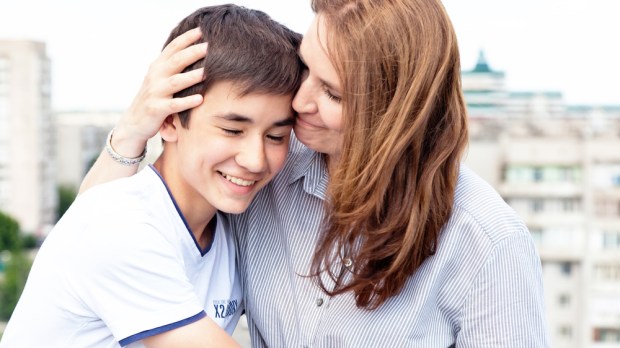A child’s environment is so important to their success. But one key part of the environment is easily overlooked, and St. Teresa of Avila urged parents to give it more attention.
We see the importance of the environment reflected in so many educational philosophies. Montessori educators stress the importance of the “prepared environment,” Charlotte Mason devotees propose that “education is an atmosphere,” and both teachers and homeschool educators spend tons of time on schoolroom organization and decor.
Part of giving children a wholesome and informative environment is purely physical. Engaging books and beautiful materials make learning attractive to children.
But part of the environment is also the other people in it. And their importance cannot be overstated.
On the most basic level, we see the importance of the social environment reflected in the child’s relationship with their teacher or parent. Connecting with the child is the first step to teaching them. A child is so much more likely to cooperate with parents and teachers when the connection between them is warm and strong.
At the same time, adult authorities are only one part of the social environment. The child’s friends have an enormous influence on the child, perhaps more than parents even realize. This is especially true for teenagers, whose need for peer acceptance is the highest it will ever be in their lives.
St. Teresa of Avila learned the hard way that friends can do a lot of damage, even to good kids who want to do the right thing. As a teenager, she fell under the influence of a cousin whose morals were questionable at best.
St. Teresa’s own parents and siblings were holy people, but she imitated her relative instead. And this relative tempted her to all kinds of wrong behavior. She describes in her autobiography,
I had a sister much older than myself, from whom, though she was very good and chaste, I learned nothing, whereas from a relative whom we often had in the house I learned every kind of evil. This person was so frivolous in her conversation that my mother had tried very hard to prevent her from coming to the house, realizing what harm she might do me, but there were so many reasons for her coming that she was powerless. I became very fond of meeting this woman. I talked and gossiped with her frequently; she joined me in all my favorite pastimes; and she also introduced me to other pastimes and talked to me about all her conversations and vanities.
This relative’s evil influence was so great that it led St. Teresa away from God. She writes,
Until I knew her (this was when I was about fourteen or perhaps more: by knowing her I mean becoming friendly with her and receiving her confidences) I do not think I had ever forsaken God by committing any mortal sin, or lost my fear of God … The result of my intercourse with this woman was to change me so much that I lost nearly all my soul’s natural inclination to virtue.
After some time, fortunately, Teresa left home and the influence of this relative. And there’s a major happy ending, since eventually she went on to become one of the greatest saints of all time. But her experience with peer pressure as a teenager left her changed.
As a result, she wanted all parents to know what had happened so that they could keep their own children safe from bad influences. She wanted all parents to give thought and attention to the social influences that surround their kids. She wrote,
I am sometimes astonished at the harm which can be caused by bad company; if I had not experienced it I could not believe it. This is especially so when one is young, for it is then that the evil done is greatest. I wish parents would be warned by me and consider this very carefully.
For modern parents, good influences might also include the TV shows, movies, and books our children watch and read. St. Teresa encouraged parents “to contrive that their children shall always, and in every way, see things that are good.”
Each child is different, so each family will have different standards about the media their children consume. But St. Teresa’s encouragement to shield our kids from negative influences is a principle to take to heart.
Instead, we can encourage friendships with kids who are positive and kind. These kinds of friends aren’t always easy to find! Something to pray hard for is that our kids will meet good and holy friends.
St. Teresa also understood what a heartening influence good friends can be. She wrote,
I have learned what great advantage comes from good companionship; and I am sure that if at that age I had been friendly with good people I should have remained sound in virtue. For, if at that time I had had anyone to teach me to fear God, my soul would have grown strong enough not to fall.
On her feast day today, let’s ask St. Teresa for her intercession to bring our children good and holy friends who will encourage them on the path of virtue. If anyone can sympathize with this prayer intention and fervently join in our prayers for it, it’s St. Teresa!



